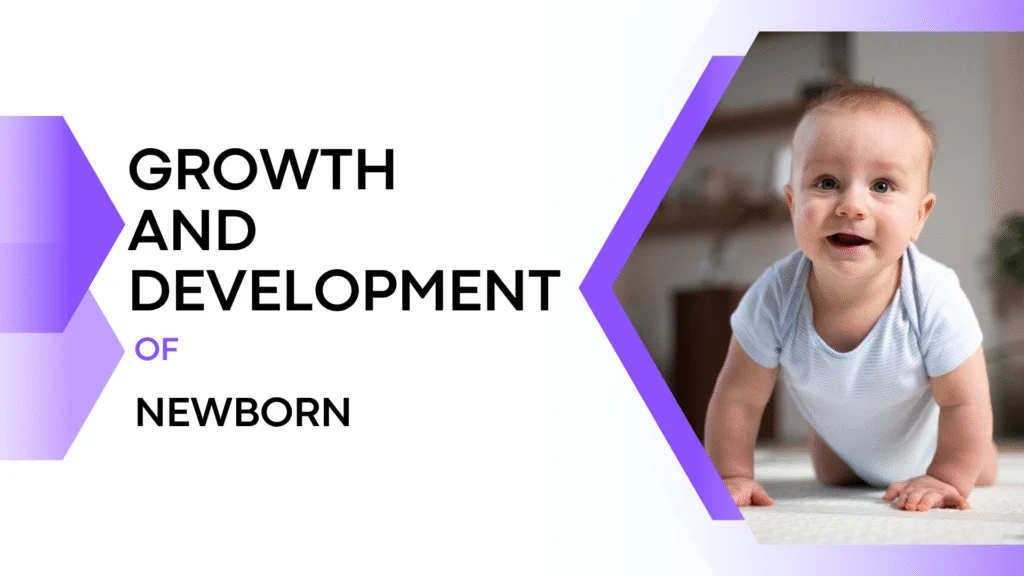The first few months of your baby’s life are full of changes, wonder, and countless “firsts.” From the first smile to the first time your baby rolls over, every moment marks a significant step in your little one’s journey. Understanding the growth and development of newborn babies helps parents track progress, identify needs, and nurture their child’s well-being confidently.
This complete guide will help you understand what to expect during your baby’s early stages.
Before that, enter the details for a free growth chart.
Simplify parenting with our app.
Click on This Link

Understanding the Growth and Development of Newborn
The term growth and development of newborn refers to the physical, emotional, and cognitive progress that occurs during the first year of life.
- Growth includes physical changes such as height, weight, and head circumference.
- Development includes progress in movement, language, social interactions, and sensory skills.
Each baby grows at their own pace, but having a general idea of what’s expected at each stage helps parents ensure their baby is thriving. Regular pediatric visits, a healthy diet, and milestone tracking are key parts of this journey.
Physical Growth Milestones
Physical growth is one of the most noticeable aspects of your baby’s development. Here’s what you can generally expect during the early months:
a. Birth to 1 Month
- Babies typically gain 150–200 grams per week.
- Head control is minimal, and reflexes like sucking and grasping are strong.
- Sleep patterns are irregular, with most babies sleeping up to 16–18 hours a day.
b. 1 to 3 Months
- Weight and length continue to increase steadily.
- Babies begin to lift their heads during tummy time.
- Eyes start to track moving objects and faces.
c. 4 to 6 Months
- Weight may double from birth weight by six months.
- Babies can roll over, grasp toys, and reach out for objects.
- They begin recognizing familiar faces and sounds.
d. 7 to 12 Months
- Babies start sitting, crawling, and possibly walking with support.
- The pincer grasp develops, helping them hold smaller items.
- They show curiosity and respond to their names.
Physical growth also includes head circumference and muscle development, which pediatricians regularly measure to ensure healthy progress.
Cognitive Development Milestones
Cognitive development refers to how a baby learns, thinks, and explores their environment. It’s the foundation of intelligence, problem-solving, and communication.
- 0–3 Months: Babies begin to recognize voices and respond to sounds.
- 4–6 Months: They start to explore objects using their hands and mouths.
- 6–9 Months: Babies learn cause and effect (e.g., shaking a rattle makes a sound).
- 9–12 Months: They understand simple words like “no” and “bye-bye” and can imitate actions.
Encouraging curiosity through playtime, songs, and conversation greatly supports mental growth.
Emotional and Social Development
Bonding is crucial during the first year. Newborns rely on emotional connection for security and comfort.
- Newborn Stage: Babies recognize their parents’ voices and feel soothed by touch.
- 3–6 Months: They smile socially, showing joy when familiar faces appear.
- 6–12 Months: Babies may experience separation anxiety but also show affection and attachment.
Responding with love, attention, and consistency helps your baby develop trust and emotional stability — a key part of the growth and development of newborn babies.
Language and Communication Development
Communication starts long before your baby speaks their first word.
- 0–3 Months: Babies coo and make simple vowel sounds.
- 4–6 Months: They start babbling (“ba-ba,” “ma-ma”).
- 6–9 Months: They respond to tone and familiar voices.
- 9–12 Months: First meaningful words may appear.
Talk to your baby often, describe what you’re doing, and respond to their sounds — it boosts early language skills.
Sensory Development in Newborns
Babies learn about the world through their senses — touch, sight, hearing, smell, and taste.
- Sight: Newborns can focus on close objects and recognize faces by 2–3 months.
- Hearing: They respond to familiar voices and soothing sounds.
- Touch: Gentle touches and cuddles make babies feel safe.
- Smell and Taste: Newborns can identify their mother’s scent and prefer sweet tastes.
Providing a variety of sensory experiences (soft toys, music, and gentle massages) supports brain and sensory development.
Why Tracking Growth and Development of Newborn Is Important?
Tracking milestones helps you identify if your baby’s progress is on track or if any areas need attention. Early detection of developmental delays allows for timely medical or therapeutic support.
Monitoring growth patterns, feeding schedules, sleep cycles, and emotional behavior ensures your baby receives the best care. Traditionally, parents used manual records or notes. Today, digital tools like KidsCur make this process seamless and reliable.
Before that, enter the details for a free growth chart.
Why Choose KidsCur for Tracking Growth Milestones?
There are several apps available today, but KidsCur stands out because it’s specifically designed for parents and pediatricians who value accuracy, simplicity, and care. Its user-friendly interface makes it easy for new parents to navigate and track their baby’s progress without any confusion.
The platform ensures data privacy and security, keeping your child’s medical information safe and confidential at all times. Beyond just tracking milestones, KidsCur offers holistic parenting support by providing expert guidance on feeding, sleep routines, and immunizations, making it an all-in-one companion for every stage of your baby’s development.
Before that, enter the details for a free growth chart.
FAQs
Why is it important to track my newborn’s developmental milestones?
Tracking helps you monitor your baby’s progress and detect any delays early. It ensures your baby’s growth is on track for their age.
How often should I update my baby’s growth data in the KidsCur app?
You can update it after each doctor visit or every month. KidsCur keeps records automatically organized for easy comparison.
Can KidsCur be used for more than one child?
Yes! The app supports multiple profiles, making it perfect for parents with more than one child. It stands out because it’s specifically designed for parents and pediatricians who value accuracy, simplicity, and care.

